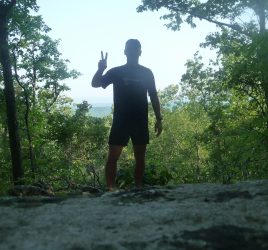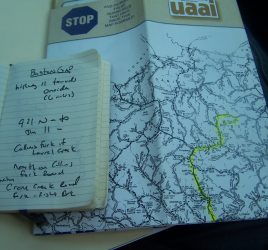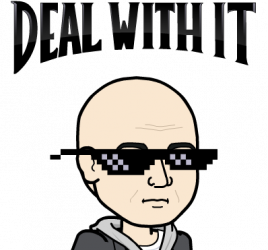Why You Think Appalachians Vote Against Their Self Interest
“The only way it’s ever going to change for us is if a poor person is elected president, and that isn’t going to happen.”
How I See People Viewing Appalachia
When elections roll around, I try to pay close attention to how people speak about Appalachia. I do that because I’m both interested in how candidates address the idea of race and class without ever mentioning either, and I’m interested how commentators respond to that politicking.
In general, here’s how I divide that commentary:
- those who can’t understand why Appalachians, particularly from the central and south regions, would vote Republican; and
- those who try to imprint their own ideals on Appalachians to push an agenda that has little to do with helping Appalachians.
There seems to be no middle ground when it comes to Appalachia. People either believe these folks are ignorant, gun-toting rednecks who hate everybody who isn’t white, or these folks are salt-of-the-earth, blue collar workers without whom the country couldn’t function so let’s just leave them alone.
The problem is that neither of those archetypes describes the Appalachia that I know.
The Questions My Friends Ask
When I set out to write So Far Appalachia, I had in mind that I wanted to address the stark dichotomy between how Democrats and Republicans viewed the region.
My friends on the Left couldn’t wrap their heads around the idea that Appalachians would turn away help from the government, and my friends on the Right believed that the Appalachian disdain for the government meant they were free-market Libertarians who wanted nothing more than all social structures to go away.
Whenever I’d finish conversations on the subject, my friends on the Left seemed to believe I was a neocon zealot and my friends on the Right seemed to believe I was one step away from a socialist.
I realized within those conversations there was a question I needed to explore: Why is Appalachia the way that it is?
The Four Rails of America
As the book research evolved and as I’ve dug through my family’s history, four themes emerged.
These four ideas — politics, poverty, guns, and education — are the Four Rails of American public discourse. We define ourselves very much by how we think the government should operate, how we approach wealth, where we put our faith, and how we think we should prepare the next generation of Americans.
The stories we each tell about those Four Rails reveal a great deal about the type of individual we happen to be. At least that’s the premise of So Far Appalachia.
While I’m writing the story of my family’s journey from England to the New World and its role in founding parts of the South, the book will explore how those Four Rails impacted by family and hopefully present an answer to that question that can be generalized across the region.
The Compact Explanation
In the end, I think neither side will find the answer very satisfying.
My friends on the Left won’t enjoy the reality that at several points in my family’s Appalachian history, the government came with grand promises to build infrastructures and to support businesses only to turn its back on the region when competition got fierce and resources dwindled. The region was slowly choked because of that, and the people became righteously wary of outside forces coming to help.
My friends on the Right won’t enjoy the reality that localized education systems had almost no impact on the region. Small one-room schoolhouses did just enough to educate a small group of residents, but it took systemic change throughout the region to begin to shift the tidal forces. Unfortunately, the prevailing attitudes towards central control have hamstrung many of those efforts.
What has emerged from the history of my family has been a complex tale of well-to-do individuals who helped settled Appalachia, who helped build a region, who worked with the government to build the region, who saw government support dry up, who watched outside corporate interests gut the region, and who eventually had to focus all their energy on survival and protection.
My family, who were once part of the Royal Court in England, who were gunmakers in Philadelphia just before the Revolutionary War, who were civic leaders in three different states, who helped found one university and ran several one-room schools in Kentucky, and who were at the root of several Kentucky counties becoming some of the poorest in the nation, represents a common story in Appalachia.
Their story, I hope, provides an answer to that elusive question.
The Answer At The End of the Book
So Far Appalachia is a portrait of a region that has been burned by governments and corporations, that has been stripped of resources with no care for the social net, that has been exploited by those who have wanted to talk about poverty without fixing the underlying causes, and that has been relegated to a series of jokes about inbreeding and toting guns.
The answer that I give to people, and the one I hope to explain in the book, is that Appalachia is the way it is because it should be that way. The people have reacted appropriately considering the forces that have acted against them.
They are both proud and despondent. They are hopeful but realistic. They aren’t ignorant. In fact, they see exactly what is happening around them. They just don’t trust that you do.
Why do they vote against government help? Because in the past that’s come at the expense of the region.
Why are they wary of corporations? Because in the past those companies have exploited their resources and left no working infrastructure behind.
Why are they pro-gun? Because gun making was considered a craft, one that was passed down from generation to generation. Because in a land of plentiful resources, hunting meant you never started.
What you shouldn’t do is assume that all of these things make the region pro-Republican. It doesn’t (even if the region tends to vote in that direction.) The region is pro-Appalachia. The people just see few places outside of their towns where change might happen.
As the CNN video shows: The people just want to stand on their own two feet, and they don’t particularly believe you have a vested interest in helping them.



